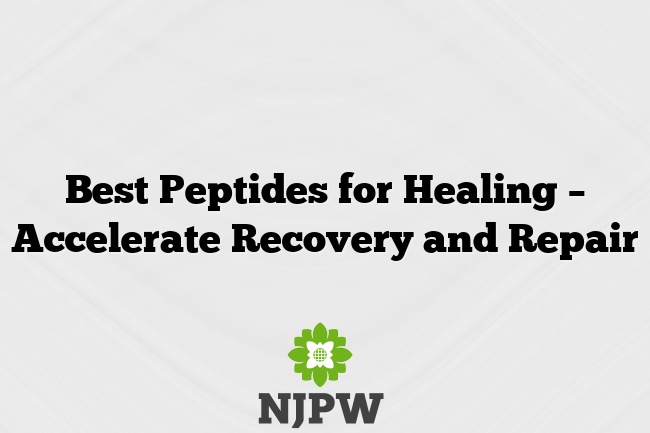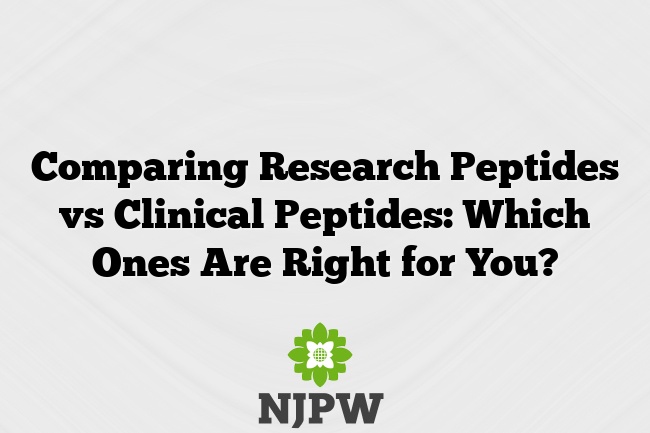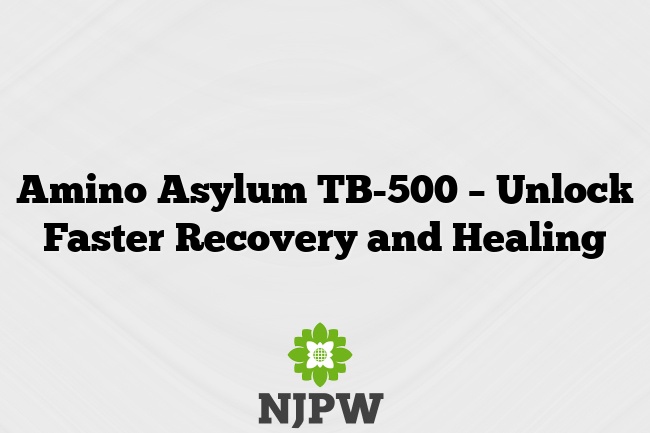Best Peptides for Healing – Accelerate Recovery and Repair

Peptides have emerged as a game-changer in the world of healing and recovery. These powerful compounds possess the remarkable ability to accelerate tissue repair, reduce inflammation, and enhance overall wellness. Whether you’re an athlete seeking to bounce back from an injury or an individual looking to optimize your body’s natural healing processes, understanding the benefits of healing peptides can be a true game-changer.
| Peptide | Key Benefits | Ideal For |
|---|---|---|
| BPC-157 | Promotes rapid healing of wounds, tendons, and ligaments | Sports injuries, joint pain, and tissue damage |
| TB-500 | Enhances muscle repair, reduces inflammation, and stimulates angiogenesis | Muscle recovery, joint health, and cardiovascular support |
| Thymosin Alpha-1 | Boosts immune function, accelerates wound healing, and supports tissue regeneration | Immune system support, skin health, and anti-aging |
What are Peptides?
Peptides are short chains of amino acids that play a crucial role in a wide range of physiological processes. Unlike larger proteins, peptides are more readily absorbed and utilized by the body, making them an increasingly popular choice for therapeutic and performance-enhancing applications. These bioactive compounds can influence everything from muscle growth and fat metabolism to inflammation and immune function.
In the context of healing and recovery, specific peptides have demonstrated remarkable abilities to stimulate tissue repair, reduce inflammation, and support the body’s natural healing mechanisms. By understanding the unique properties and applications of these peptides, individuals can unlock powerful tools for accelerating recovery and optimizing overall health.
Key Benefits of Healing Peptides
The primary benefits of incorporating healing peptides into your regimen include:
– Accelerated Tissue Repair: Certain peptides, such as BPC-157 and TB-500, have been shown to enhance the body’s ability to repair and regenerate damaged tissues, including muscles, tendons, ligaments, and even bone.
– Reduced Inflammation: Many peptide supplements for healing possess anti-inflammatory properties, helping to alleviate pain, swelling, and discomfort associated with injuries and chronic conditions.
– Improved Immune Function: Peptides like Thymosin Alpha-1 can bolster the immune system, supporting the body’s natural ability to fight infection and promote faster healing.
– Enhanced Recovery: By addressing the key factors that impact healing, such as inflammation and tissue repair, peptides that promote healing can significantly improve recovery times and help individuals bounce back from injuries or strenuous activities.
– Optimized Cellular Function: At the cellular level, healing peptides can stimulate processes like protein synthesis, angiogenesis, and cell proliferation, all of which contribute to the body’s natural healing and regenerative capabilities.
Compounds that Support Tissue Repair
Among the most well-researched and effective peptides for tissue repair are:
– BPC-157 (Body Protective Compound 157): This peptide has demonstrated remarkable abilities to accelerate the healing of wounds, tendons, ligaments, and even the gastrointestinal system. BPC-157 is believed to promote the production of growth factors and enhance the migration of reparative cells to the site of injury.
– TB-500 (Thymosin Beta-4): This peptide is known for its ability to stimulate the growth of new blood vessels (angiogenesis), which is crucial for delivering oxygen and nutrients to damaged tissues. TB-500 also exhibits anti-inflammatory properties and can support muscle repair.
– Thymosin Alpha-1: In addition to its immune-boosting effects, this peptide has been shown to accelerate wound healing and support tissue regeneration. Thymosin Alpha-1 may also play a role in regulating inflammation and promoting collagen synthesis.
These are just a few examples of the top peptides for tissue repair that have garnered significant attention in the realm of healing and recovery. As research continues to evolve, the potential applications of these and other peptides continue to expand.
How Peptides Accelerate Recovery
The mechanisms by which peptides accelerate recovery are multifaceted and complex, but they can be broadly summarized as follows:
– Reducing Inflammation: Many healing peptides possess potent anti-inflammatory properties, which can help alleviate pain, swelling, and discomfort associated with injuries or overuse.
– Stimulating Tissue Repair: Peptides like BPC-157 and TB-500 can directly stimulate the body’s natural healing processes, promoting the proliferation and migration of reparative cells to the site of injury.
– Enhancing Angiogenesis: The growth of new blood vessels (angiogenesis) is crucial for delivering oxygen and nutrients to damaged tissues, and peptides like TB-500 can support this process.
– Modulating Immune Function: Peptides such as Thymosin Alpha-1 can bolster the immune system, helping to ward off infection and support the body’s natural healing mechanisms.
– Optimizing Cellular Function: At the cellular level, peptides can stimulate processes like protein synthesis, cell proliferation, and the production of growth factors, all of which contribute to faster recovery and tissue regeneration.
By understanding the multifaceted ways in which peptides that aid in healing can support the body’s natural healing processes, individuals can make informed decisions about incorporating these powerful compounds into their recovery and wellness regimens.
Selecting the Right Peptide for Your Needs
When it comes to peptides for healing, there is no one-size-fits-all solution. The specific peptide or combination of peptides that will be most effective for your needs will depend on a variety of factors, including:
– Type of Injury or Condition: Different peptides may be more suitable for addressing specific types of injuries or health concerns, such as joint pain, muscle damage, or skin wounds.
– Desired Outcomes: Are you primarily focused on reducing inflammation, accelerating tissue repair, or boosting immune function? Matching the peptide to your specific goals is crucial.
– Individual Physiology: Factors like age, gender, and overall health status can influence how an individual responds to different peptide therapies.
– Dosage and Administration: Proper dosing and administration (e.g., subcutaneous injection, oral supplementation) are essential for maximizing the effectiveness of healing peptides.
It’s important to work closely with a healthcare professional or experienced peptide specialist to determine the best peptides for your healing needs and to ensure safe and effective use. Personalized guidance can help you navigate the complexities of peptide selection and implementation for optimal results.
Maximizing the Effectiveness of Healing Peptides
To get the most out of your peptide supplements for healing, consider the following strategies:
– Proper Timing: Incorporate peptides into your recovery plan at the appropriate stages, as they may be more effective for certain phases of the healing process.
– Combine with Complementary Therapies: Integrate peptides with other evidence-based modalities, such as physical therapy, nutrition, and lifestyle modifications, for a comprehensive approach to healing and recovery.
– Optimize Dosing and Administration: Work closely with a healthcare professional to determine the optimal dosage and administration method (e.g., subcutaneous injection, oral supplementation) for your specific needs.
– Monitor and Adjust: Closely track your progress and be prepared to make adjustments to your peptide regimen as needed to ensure continued effectiveness and safety.
– Prioritize Quality and Purity: Source your peptides for injury recovery from reputable, high-quality suppliers to ensure you’re getting the intended compounds and avoiding potential contaminants.
By taking a strategic and holistic approach to the use of peptides that promote healing, you can maximize the benefits and optimize your recovery and overall well-being.
Safety Considerations for Using These Compounds
While peptides for healing are generally considered safe when used under the guidance of a healthcare professional, it’s important to be aware of potential side effects and safety considerations:
– Proper Dosing: Exceeding the recommended dosage or improper administration can increase the risk of adverse effects, such as injection site reactions or hormonal imbalances.
– Potential Interactions: Certain peptides may interact with medications or other supplements, so it’s crucial to disclose your full medical history and current regimen to your healthcare provider.
– Contraindications: Some individuals, such as those with certain medical conditions or who are pregnant or nursing, may not be suitable candidates for peptide therapy.
– Long-Term Effects: The long-term safety and effects of sustained peptide use are still being studied, so it’s essential to work closely with a qualified professional and monitor for any potential issues.
– Quality and Purity: Sourcing peptides for sports injury recovery from reputable, high-quality suppliers is crucial to ensure you’re getting the intended compounds and avoiding potential contaminants.
By prioritizing safety and working closely with a healthcare provider, you can confidently incorporate peptides for healing into your recovery and wellness regimen.
Exploring the Research on Peptide Therapy
The scientific community has been actively exploring the potential of peptides that aid in healing for decades, with a growing body of evidence supporting their efficacy and safety:
– Animal Studies: Numerous animal studies have demonstrated the ability of peptides like BPC-157 and TB-500 to accelerate the healing of various types of injuries, including wounds, tendon and ligament tears, and even bone fractures.
– Clinical Trials: While the research on peptides for healing in humans is still relatively limited, several clinical trials have shown promising results, particularly in the areas of wound healing, joint repair, and muscle recovery.
– Mechanism of Action: Extensive research has elucidated the various mechanisms by which healing peptides exert their beneficial effects, including their anti-inflammatory properties, ability to stimulate tissue repair, and influence on cellular processes.
– Ongoing Investigations: As the scientific community continues to explore the potential of peptide therapy for wound healing and other applications, new discoveries and advancements are likely to emerge in the coming years.
While the existing research is encouraging, it’s important to note that the long-term effects and optimal usage of peptides for healing are still being investigated. Consulting with a healthcare professional who is knowledgeable in this area is crucial for ensuring safe and effective implementation.
Proper Administration and Dosing Guidelines
The proper administration and dosing of peptides for healing are critical for ensuring optimal results and minimizing the risk of adverse effects. Here are some general guidelines to consider:
– Administration Routes: Peptides are typically administered via subcutaneous injection, though some may also be available in oral or topical formulations. The specific route of administration can vary depending on the peptide and the desired therapeutic effect.
– Dosage Ranges: The recommended dosages for peptides that promote healing can vary widely, ranging from micrograms to milligrams, depending on the specific peptide, the individual’s needs, and other factors. It’s essential to work closely with a healthcare professional to determine the appropriate dosage.
– Timing and Frequency: The timing and frequency of peptide administration can also play a crucial role in their effectiveness. Some peptides may be most beneficial when taken at specific times of day or in relation to exercise or other activities.
– Cycling and Pulsing: Depending on the peptide and the individual’s needs, a “cycling” or “pulsing” approach (alternating periods of use and rest) may be recommended to optimize the benefits and minimize the risk of potential side effects.
– Individualized Approach: Given the complexity of peptide therapy, a personalized approach is essential. Healthcare providers should closely monitor an individual’s response and make adjustments to the administration and dosing as needed.
Proper guidance from a qualified healthcare professional is crucial for ensuring the safe and effective use of peptides for healing.
Integrating Peptides into a Holistic Recovery Plan
While peptides for accelerated healing can be a powerful tool in your recovery arsenal, it’s essential to view them as part of a comprehensive, holistic approach to wellness and injury management. Some key considerations for integrating peptides into a holistic recovery plan include:
– Nutrition and Supplementation: Ensuring adequate intake of nutrients, vitamins, and minerals that support tissue repair and immune function can enhance the effectiveness of healing peptides.
– Physical Therapy and Rehabilitation: Incorporating targeted exercises, manual therapies, and other rehabilitative modalities can work synergistically with peptide therapy to optimize the healing process.
– Stress Management: Reducing stress and promoting relaxation can positively impact the body’s natural healing mechanisms, complementing the effects of peptide therapy.
– Lifestyle Modifications: Adopting healthy habits, such as adequate sleep, hydration, and active recovery, can create an optimal environment for healing and recovery.
– Ongoing Monitoring and Adjustment: Regularly evaluating progress and making necessary adjustments to your holistic recovery plan, including your peptide regimen, can help ensure continued effectiveness and safety.
By taking a comprehensive, integrative approach to healing and recovery, you can harness the full potential of peptides for healing and achieve your wellness goals.
Conclusion
Peptides have emerged as a game-changing tool in the world of healing and recovery, offering a multitude of benefits for individuals seeking to accelerate tissue repair, reduce inflammation, and optimize their overall well-being. By understanding the unique properties and applications of these powerful compounds, you can unlock the keys to faster recovery, enhanced performance, and improved quality of life.
Frequently Asked Questions
What are the most effective peptides for wound healing?
The peptides that have shown the most promise for accelerating wound healing include BPC-157, Thymosin Alpha-1, and TB-500. These peptides have demonstrated the ability to stimulate tissue repair, reduce inflammation, and support the body’s natural healing processes.
How long do peptides take to heal injuries?
The timeline for healing with peptides can vary depending on the type and severity of the injury, as well as the specific peptide being used. In general, many individuals report seeing improvements in as little as 2-4 weeks, with continued progress over the course of several months.
What are the potential side effects of using peptides for healing?
Peptides are generally well-tolerated, but potential side effects may include injection site reactions, hormonal imbalances, and interactions with certain medications. It’s crucial to work closely with a healthcare professional to ensure safe and appropriate use.






